|
Enter content here PM Talked in Two Languages. In want of an interpreter, Prime-Minister Simeon Saxe-Coburg-Gotha was forced to personally translate his speech from English into Bulgarian at the opening of the Stability Pact Business Consultative Council. The interpreter came as late as in 3 minutes. Bulgarian officials frustrated projects accounting for Euros 600 million and the Stability Pact could suspend the funds, it transpired at the forum.
Photo Nikolai Doncev (ML) BULGARIAN CONTINGENT - AFGHANISTAN. The Bulgarian contingent for the International Security Assistance Force (ISAF) in Afghanistan displayed the materiel it will use to service the international peacekeepers in Kabul. The UK Defence Attache, Colonel Richard Chonglinski, and General Nikola Kolev of the Bulgarian General Staff check the operability of the decontamination shower facility. Pressphoto BTA Photo: Tihomir Penov A regular police officer walks behind a police armored personnel carrier through THE Macedonian village of Ratae, 32 kilometers (20 miles) northwest of Macedonia's capital Skopje, Thursday, Feb. 7, 2002. Macedonian police still guard the village fearing attacks from ethnic Albanian splinter insurgent groups. (AP Photo/Andrej Ginovski)
Bulgarian figure skaters Albena Denkova and Maxim Staviyski practice their free dance program in Salt Lake City before the Salt Lake 2002 Olympic Winter Games, February 7, 2002. The Games begin on February 8. REUTERS/David Gray Supporting Bulgaria To Join EU. Bulgarian President Gueorgui Parvanov (L) and Euro Parliament President Pat Cox of Ireland during a press conference held in Strasbourg, February 7. cEPA New York Press: Happy Days, Here Again. Reality Macedonia - New York Press Top Drawer-The Bunker
George Szamuely Forget the war on terrorism. The United States is once again supporting the drug dealers, gangsters and warlord fundamentalists. The other day a State Dept. official met Chechnya’s self-declared foreign minister, Ilyas Akhmadov. The Russians were dismayed. Having thrown their lot in with the supposed common struggle against terrorism, they find the Americans giving support to terrorists. Last month, after a post-Sept. 11 lull, the U.S. stepped up its criticism of human rights abuses in Chechnya. The Russians professed to be "amazed" that the United States, as Agence France Presse reported, would meet with Chechens, "whose direct links with Osama bin Laden and al-Qaeda are being proven with constantly emerging, irrefutable evidence…" Chechnya has always been seen here as a rerun of Kosovo, which itself was a rerun of Afghanistan. All the ingredients are there: a spurious "national liberation" struggle financed by organized crime, drug trafficking and the global Islamic network; support from Western governments and human rights groups; Islamic fundamentalism as a substitute for genuine nationhood; violently enforced clan loyalty; political legitimacy based on appeals to Islam; and terrorists in power. Consider Kosovo: The U.S. is currently brokering a deal on the distribution of power. Leaders of the three leading Kosovo Albanian parties recently met the head of the U.S. office in Prishtina, John Menzies, and it was proposed that the job of prime minister should go to Hashim Thaci’s Democratic Party of Kosovo (DPK). Thaci is the leader of the Kosovo Liberation Army (KLA). Its links to Islamic terrorism and bin Laden have been amply documented. The KLA allegedly disbanded after the NATO takeover and reconstituted itself as a "civil defense force," the Kosovo Protection Corps (KPC). Its wages were paid by the UN. 
Last summer, the Bush administration discovered that the KPC was a terrorist organization after all and that it was fueling a terrorist insurgency in neighboring Macedonia. The President signed two decrees depriving "Albanian extremists who were threatening the stability of Macedonia" of all financial or material support. The decrees also barred them from entering the United States. This followed the embarrassing revelation that the U.S. military had facilitated the escape of NLA terrorists holed up in Arcinovo from the Macedonian army. According to Hamburger Abendblatt, "Among the rebels that were withdrawing were 17 ‘instructors’–former US officers that provided military training for the rebels. Not only that: the Macedonian security forces claim that 70 percent of the equipment that the guerrilla fighters took with them are of US production." The "instructors" were almost certainly members of an outfit called Military Professional Resources Incorporated (MPRI). It is filled with former senior U.S. Army personnel and works on contract for the U.S. government. It had trained and directed the Croatian army during Operation Storm, in which something like 300,000 Serbs were driven out of their homes in Krajina. One of the commanders of Operation Storm was an Albanian, Agim Ceku, who also happens to be the chief of the Kosovo Protection Corps. The people Bush banned from entering the United States included Gezim Ostremi, the KPC’s chief-of-staff; his replacement, Daut Haradinaj; the commander and deputy commander of the KPC’s elite force, the Rapid Reaction Corps, plus the leaders of two of its six regional divisions, Sami Lushtaku and Mustafa Rrustem. The UN expressed shock and surprise and demanded proof that people on its payroll were terrorists. This was an odd request. The UN had itself reported a year earlier that the KPC was a bunch of gangsters. The U.S. decrees were more rhetoric than reality. As an Irish Times report put it sarcastically: "Commander Rrustem…earned fame during the Kosovo war as one of the most successful guerrilla commanders. He has since become a favourite with NATO commanders, whose glowing commendations line the walls of his office. Certainly if the Americans have reservations about him they have yet to show it: on Tuesday two separate US army teams came to his base to train his men." There we have it: The KLA-NLA terrorists are funded by U.S. military aid, the UN peacekeeping budget, Al Qaeda and by drug trafficking and prostitution. If everything goes according to plan, their leader is about to be appointed prime minister thanks to U.S. efforts. O what a lovely war! Now on to Central Asia. Washington now has 13 bases in nine countries ringing Afghanistan and in the Gulf. Agreements are in place to use airfields in Tajikistan. An air base is being built in Kyrgyzstan to hold 3000 troops. Gen. Tommy Franks vows to crush the Islamic Movement of Uzbekistan. Assistant Secretary of State Elizabeth Jones promises $160 million in aid. Some 1500 U.S. servicemen are already stationed there; 3000 American troops are in Kyrgyzstan. Deputy Defense Secretary Paul Wolfowitz says the bases will serve to facilitate cooperation and training with the local military. In other words, the U.S. will, as in the Balkans, play the Islamists and anti-Islamists off against each other and reduce the countries to abject dependence. If the fates of Kosovo and Macedonia are anything to go by, the Soviet Union era will soon seem like a glorious one. PRESIDENT TRAJKOVSKI MEETS WORLD BANK PRESIDENT WOLFENSHON. MIA 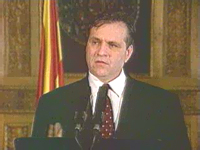
Macedonian President Boris Trajkovski had a meeting Thursday with the World Bank President, James Wolfenshon, also attended by Macedonian Vice-Premier Zoran Krstevski and Finance Minister Nikola Gruevski.
At the meeting, Trajkovski extended his gratitude for the World Bank support of Macedonia, by granting a credit in December 2001 for urgent economic revival at amount of US$ 15 million.
Trajkovski said that Macedonia met all conditions for convening of a Donors' Conference by adopting of the constitutional changes and Local Government Law. He asked for the World Bank to sent favorable message to other donors to grant real support to Macedonia at the forthcoming conference, as such support is necessary for economic stabilization of the country. In addition, Trajkovski asked for a World Bank grant that would be used for the displaced persons and reconstruction of their homes.
"It is necessary for the international financial institutions to take part in this project," Trajkovski said.
He also asked for assistance in realization of an appropriate financial arrangement for severance pay to employees at the loss-making companies.
Referring to the FESAL-arrangement, Trajkovski said that Macedonia, according to its possibilities, carried out the agreed reforms in the financial system and in regard with a reconstruction of the loss-making companies. In this respect, Trajkovski asked for the World Bank to be more flexible regarding the conditions for withdrawing of the second installment of this arrangement.
In compliance with the international community request and the World Bank instructions, Macedonia enhanced the control of financial transactions, particularly in preventing of money laundry, aimed at terrorist or other purposes. in this context, a special Directorate for money laundering prevention is established within the Finance Ministry.
Trajkovski referred to the poverty reduction program in particular. Upon setting of a Strategy on poverty reduction, Macedonia has been working with the World Bank on the final version of this document, which should encompass detailed approach towards alleviating of the greatest economic problem in the country, because over 20% of the population is living at the edge of poverty. The process should be transparent, including wide scope of consultations of the governmental institutions with non-governmental organizations, the trade union federation, private sector, international financial institutions and bilateral donors.
Yesterday, Trajkovski met in Washington with administrator of US Agency for International Development (USAID) Andrew Natsios and informed him on the current political situation in Macedonia, stressing the importance and the contribution of USAID in realizing several projects in the economic sphere, political system, local self-government and the legal reforms.
Trajkovski emphasized the necessity of USAID's support in the implementation of the Framework Agreement and the Law on local self-government, as well as for providing technical support in the process of decentralization and carrying out reforms in the local authority.
Natsios informed that USAID is involved and engaged in the preparations of the donor's conference. He also informed Trajkovski about the preliminary proposals of US President George Bush for allocation of the means from the new US budget. In that respect, Natsios informed that the grants to some countries would be limited, expressing his assurance that it would not be a case with Macedonia, as the means for Macedonia would be increased. 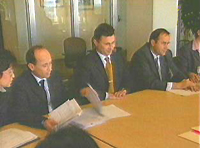
Macedonian Finance Minister Nikola Gruevski, Vice Premier Zoran Krstevski and Minister of Economy Besnik Fetai will have a meeting with high officials of the International Financial Corporation (IFC) today, where they are expected to finish the negotiations for the PSMAC arrangement and the redesigning of the financial gap.
Significant progress has been achieved in the ongoing negotiations between Macedonia and the World Bank in Washington on the public administration reform (PSMAC), the Macedonian Finance Ministry said in a press release.
Both delegations are also working on setting the details for withdrawing of the second installment of the FESAL 2 arrangement.
Determining of all details on PSMAC arrangement will lead to the final phase, i.e. negotiating of the agreement wording. Accordingly, there is a real possibility for the World Bank Board to approve this arrangement for Macedonia, under IDA-conditions, by the end March. This will be the first Macedonia's arrangement with an international institution on public administration reform, which is aimed at improving of the administration efficiency, and should be completed in one year.
Yesterday, Macedonian Finance Minister Nikola Gruevski, accompanied by Vice-Premier Zoran Krstevski and Minister of Economy Besnik Fetai, discussed the FESAL 2 - arrangement with World Bank Executive Director Pitter Steck and World Bank Vice-President Johannes Linn.
The World Bank officials gave credit to the Macedonian Government for its significant results in resolving of the problems with the loss-making companies.
The World Bank hailed this move, encouraging the government to continue with the reforms of the enterprises, and almost completely accepted the changes to the laws, which will significantly speed up the bankruptcy and liquidation procedure. The Agency for blocked accounts was obliged to open bankruptcy procedure for all accounts that were closed for longer than 45 days.
The World Bank representatives stressed that the changes suggested by the Macedonian experts would provide good results.
However, the World Bank categorically rejected the suggestion from the Macedonian Government for returning of the old legislation, according to which the workers from bankrupted companies with 25 years of service could be early retired.
In that context, it was underlined that if the government still decides to apply this solution, it should forget about the cooperation with the World Bank.
The Macedonian government representatives highlighted the World Bank support for implementation of the reforms in the enterprises' sector regarding the employees who loose their jobs due to liquidation of the companies. If the World Bank does not help to the Macedonian government in this field, the government could be discouraged regarding the reforms due to the constant strikes and pressures, reads the announcement from the Ministry of Finance.
The meeting with deputy director of the International Monetary Fund Suzanne Schedler was also focused on this issue. Head of the IMF mission to Macedonia Bixvajit Banerjee was also present at this meeting.
Talks on the restructuring of the fiscal gap, as part of the FESAL 2 arrangement, were also discussed.
One of the conditions for Macedonia to receive the second tranche of the FESAL 2 is the successful resolving of the "Jugohrom" enterprise status. All other conditions have been already fulfilled.
Special emphasis in the negotiations with IMF and World Bank was put on the upcoming donors' conference, for which Minister Gruevski would have a separate meeting with the executive director of the Bank for Macedonia Christian Portman.
Macedonia asked for a grant from the World Bank for displaced persons, for which there is a preliminary solution. 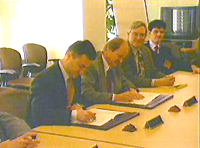
In the framework of the visit, Gruevski and Portman signed two projects on IDA terms, the first of which is intended for the development of the communities and culture, worth $5 million, and then second is a project for development of children and youth, worth $2,5 million. Several grants for this project, which need to be additionally approved, were also signed.
An agreement for Skopje water supply was not signed, after the Ministry of Transport and Communication informed the Finance Ministry that despite the successful negotiations with the World Bank in the previous year, an authorization for signing of an agreement in Washington was not given to Minister Gruevski.
If the needed authorization is received in the course of the day, the Finance Minister will make efforts to sign the agreement before his departure from Washington.
Thursday morning local time, Trajkovski will attend the 50th annual Breakfast Prayer.
The Vice-President of the Government Zoran Krstevski, Minister of Finance Nikola Gruevski, Minister of Economy Besnik Fetai and the deputies Cedomir Kraljevski, Radomir Karangelevski, Mersel Biljali, Naser Ziberi and Zamir Dika comprise the Macedonian delegation which is led by President Trajkovski.
Foreign Minister Casule Thursday morning will set out for New York to meet with the UN Secretary -General Kofi Annan. NATO SECRETARY GENERAL ROBERTSON VISITS MACEDONIA. MIA 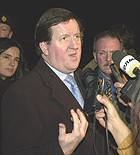
Situation in Macedonia is clearer now and I congratulate to the people of Macedonia, in particular to President Boris Trajkovski on the progress achieved, NATO Secretary General George Robertson said upon his arrival at the Skopje Airport.
Robertson's talks with the Macedonian top officials will be focused on the National Action Plan for NATO membership, an amnesty law and implementing of the Framework Agreement, which according to Robertson "should contribute to confidence building in the ethnically divided country."
"Macedonia may be united and avoid violence, " he said, adding that implementing of the Framework Agreement could be accelerated.
"The Ohrid accord is a great step towards modern Europe, showing how the country may avoid violence by parliamentary negotiations and how people in Macedonia solve their problems," he added.
Robertson expressed hope for holding of early elections, which would contribute to stabilizing of the country and its economic prosperity. He also believed that the international community would grant financial assistance, necessary to Macedonia, but it would arrive upon implementing of the Framework Agreement.
"The country's membership into the European Union and NATO, implementing of the Framework Agreement and an amnesty law are in close connection, offering prosperity to Macedonia and its citizens, " Robertson said.
Robertson expressed hope he would receive the Macedonian Government's request for extension of the Task Force Fox mandate, as TFF had done a great job in the country in regard to confidence building.
"The international community has been pretty engaged in Macedonia, and we are not leaving, as we wish to be part of the solution, particularly part of the reconstruction of a special country with an outstanding history," he added.
Robertson considered that significant progress was also achieved in southern Serbia.
"The Balkan nations should understand that problems are to be solved by political means, as violence leads to new violent acts," Robertson said. 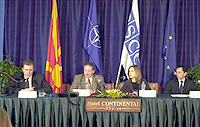
The Macedonian Government would most probably submit the formal request on extending of the NATO mission tomorrow, and it would be reviewed as soon as possible, NATO spokesman Mark Laity said at a press conference, adding that NATO military officials have been considering the possible implications from the extended presence of the NATO troops in the country, proving the Alliance's favorable attitude towards this request.
"Redeployment of police units in the crisis regions is going well, which also refers to implementing of the Framework Agreement, despite the fact that its pace is a bit slower than the international community expectations. There are also favorable and constructive response to an issue of amnesty of the former NLA members," Laity said.
OSCE spokesman Florin Pasniku also expressed satisfaction with the progress of police redeployment process, saying that preparations are underway for entering of police units in new villages. Pasniku said he had no information on returning of police in the village of Radusa, near Skopje.
"The process of confidence restoring is still underway in this village, and today the UNHCR has managed to reestablish the bus line for the first time after the conflict," Pasniku said.
The NATO and OSCE spokesmen welcomed a withdrawal of the special forces "Lions" form the village of Ratae, near Tetovo, considering this step of the Government as a strong wish for confidence building and tensions alleviating.
"This is a necessary measure, contributing to the efforts of regular police units to carry out their tasks in communities where they are welcomed, " NATO spokesman Craig Ratcliff said, expressing hope that the "Lions" will also withdraw from the village of Jegunovce, near Tetovo.
EU spokesperson Irena Gjuzelova said the EU would like for the early elections date to be set soon, if possible till the end of February.
"It will contribute to implementing of the Framework Agreement. Upon setting of this day, we will meet with President Boris Trajkovski and the major party leaders, in order to prepare a realistic time-table on passing of all laws that derive from the Framework Agreement. It will also contribute to setting of a date for the census," Gjuzelova said. She added that the Framework Agreement sent a clear message, saying that the elections should be scheduled as soon as possible.
According to hers information, about 20 Albanians did not respond to an invitation for military service, while the number of deserters is bigger. FM CASULE MEETS UN SECRETARY GENERAL ANNAN. MIA Macedonian Foreign Minister Slobodan Casule met Thursday with the United Nations Secretary General, Kofi Annan.
At the meeting, Casule briefed Annan about the current political situation in Macedonia, particularly about implementing of the Framework Agreement and passing of the Local Government Law. Adopting of the political platform presented Macedonia's wisdom and potential to surpass the crisis by political means, Casule said.
Macedonia retook its active role within the international community, giving its contribution in resolving of international problems, such as the combat against terrorism and organized crime - main generators of all crises in the region.
Mr. Annan welcomed the political solution of the crisis in Macedonia, which is strongly supported by the UN, saying that the country has chosen the best possible solution. He believed that the positive developments in the country would contribute to stabilizing of the entire region.
The UN would keep supporting the peaceful resolution of the crisis, Annan said.
The Macedonian permanent representative to the UN, Ambassador Srgjan Kerim, also attended the meeting.
On Wednesday, Casule addressed at the US Institute of Peace in Washington on topic "Macedonian Spring: Can the Peace Hold?"
In his address, Casule stressed that the reason for the crisis in the Republic of Macedonia is in the organised crime since it happened in time when the region started to democratise.
Due to this "Europe and America should combat the terrorism with all power aimed at prevention of creating new Afghanistan in the middle of Europe," Casule said.
Expressing optimism for the situation in the country, Casule said "although certain groups will try to attack the democracy, there are no open issues after the Ohrid peace Agreement and reasons for dissatisfaction, and that's why anyone that behaves differently should be treated adequately."
Around midnight according to Macedonian time, President of the Republic of Macedonia Boris Trajkovski together with Vice-President of the Government Zoran Krstevski, Minister of Finance Nikola Gruevski and Minister of Economy Besnik Fetai will meet with the World Bank President James Wolfensohn.
President Trajkovski Friday will attend the Prayer Breakfast, which is traditionally organised by the US Congress. The Vice-President of the Macedonian Government Zoran Krstevski, Ministers Gruevski and Fetai, the Macedonian Ambassador to USA, Nikola Dimitrov, as well as the deputies Cedomir Kraljevski, Radomir Karangelevski, Mersel Biljali, Naser Ziberi and Zamir Dika will also attend the Breakfast. PARLIAMENTARY DEBATE ON RECENT INCIDENTS IN MACEDONIA. MIA The debate in regard with the Information on the recent violent incidents in Negotino, Tearce, Prilep and Ohrid, which is on the agenda od 101 parliamentary session, requested by SDSM parliamentary group is scheduled to continue today.
During the debate yesterday, deputy Zarko Karadzoski from VMRO-DPMNE, announcing the position of the party, said that they accept to participate in the work of the Parliament on this topic, but only due to the political reasons, as "they should not interfere with the authorizations of the Courts, because these incidents are criminal acts."
Coordinator of SDSM parliamentary group Nikola Popovski explained the request to hold a debate on this topic, saying that in the Information submitted to the Government "all these cases were presented as technical issue."
"The Parliament should assess what is going on in Macedonia and within its authorizations should make conclusions," Popovski said. He announced that during the debate SDSM parliamentary group will submit draft-conclusions and expects the Parliament to adopt them.
This parliamentary group requests from the Assembly to determine the responsibility of at least two ministers, who according to them were directly involved in the incidents, to oblige the Government to resolve the stated incidents and not to allow these incidents to be repeated.
According to VMRO-DPMNE parliamentary group, if it is determined that Minister of Education is responsible for the incident in Negotino, he would bear the responsibility, but requests from SDSM to admit that they have manipulated the students and abused them for political purposes.
For VMRO-DPMNE, the developments in Negotino Gymnasium are "result of the SDSM's district offices and their party strategy."
According to them, the issues on the political responsibility in Negotino Gymnasium, the accusations from SDSM that members of VMRO-DPMNE have thrown Molotov cocktail in the party's premises in Ohrid as well as the allegations that VMRO-DPMNE and the Government were involved in Prilep incident of statues' stealing can be discussed only if there are arguments. NEGOTIATIONS OF MACEDONIAN DELEGATION WITH INTERNATIONAL FINANCIAL INSTITUTIONS. MIA 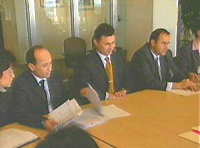
Macedonian Finance Minister Nikola Gruevski, Vice Premier Zoran Krstevski and Minister of Economy Besnik Fetai will have a meeting with high officials of the International Financial Corporation (IFC) today, where they are expected to finish the negotiations for the PSMAC arrangement and the redesigning of the financial gap.
Significant progress has been achieved in the ongoing negotiations between Macedonia and the World Bank in Washington on the public administration reform (PSMAC), the Macedonian Finance Ministry said in a press release.
Both delegations are also working on setting the details for withdrawing of the second installment of the FESAL 2 arrangement.
Determining of all details on PSMAC arrangement will lead to the final phase, i.e. negotiating of the agreement wording. Accordingly, there is a real possibility for the World Bank Board to approve this arrangement for Macedonia, under IDA-conditions, by the end March. This will be the first Macedonia's arrangement with an international institution on public administration reform, which is aimed at improving of the administration efficiency, and should be completed in one year.
Yesterday, Macedonian Finance Minister Nikola Gruevski, accompanied by Vice-Premier Zoran Krstevski and Minister of Economy Besnik Fetai, discussed the FESAL 2 - arrangement with World Bank Executive Director Pitter Steck and World Bank Vice-President Johannes Linn.
The World Bank officials gave credit to the Macedonian Government for its significant results in resolving of the problems with the loss-making companies.
The World Bank hailed this move, encouraging the government to continue with the reforms of the enterprises, and almost completely accepted the changes to the laws, which will significantly speed up the bankruptcy and liquidation procedure. The Agency for blocked accounts was obliged to open bankruptcy procedure for all accounts that were closed for longer than 45 days.
The World Bank representatives stressed that the changes suggested by the Macedonian experts would provide good results.
However, the World Bank categorically rejected the suggestion from the Macedonian Government for returning of the old legislation, according to which the workers from bankrupted companies with 25 years of service could be early retired.
In that context, it was underlined that if the government still decides to apply this solution, it should forget about the cooperation with the World Bank.
The Macedonian government representatives highlighted the World Bank support for implementation of the reforms in the enterprises' sector regarding the employees who loose their jobs due to liquidation of the companies. If the World Bank does not help to the Macedonian government in this field, the government could be discouraged regarding the reforms due to the constant strikes and pressures, reads the announcement from the Ministry of Finance.
The meeting with deputy director of the International Monetary Fund Suzanne Schedler was also focused on this issue. Head of the IMF mission to Macedonia Bixvajit Banerjee was also present at this meeting.
Talks on the restructuring of the fiscal gap, as part of the FESAL 2 arrangement, were also discussed.
One of the conditions for Macedonia to receive the second tranche of the FESAL 2 is the successful resolving of the "Jugohrom" enterprise status. All other conditions have been already fulfilled.
Special emphasis in the negotiations with IMF and World Bank was put on the upcoming donors' conference, for which Minister Gruevski would have a separate meeting with the executive director of the Bank for Macedonia Christian Portman.
Macedonia asked for a grant from the World Bank for displaced persons, for which there is a preliminary solution. 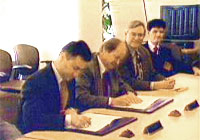
In the framework of the visit, Gruevski and Portman signed two projects on IDA terms, the first of which is intended for the development of the communities and culture, worth $5 million, and then second is a project for development of children and youth, worth $2,5 million. Several grants for this project, which need to be additionally approved, were also signed.
An agreement for Skopje water supply was not signed, after the Ministry of Transport and Communication informed the Finance Ministry that despite the successful negotiations with the World Bank in the previous year, an authorization for signing of an agreement in Washington was not given to Minister Gruevski.
If the needed authorization is received in the course of the day, the Finance Minister will make efforts to sign the agreement before his departure from Washington.
Macedonian President Boris Trajkovski Thursday morning at US time will attend the 50th annual Breakfast Prayer.
The Vice-President of the Government Zoran Krstevski, Minister of Finance Nikola Gruevski, Minister of Economy Besnik Fetai and the deputies Cedomir Kraljevski, Radomir Karangelevski, Mersel Biljali, Naser Ziberi and Zamir Dika comprise the Macedonian delegation which is led by President Trajkovski.
Foreign Minister Casule Thursday morning will set out for New York to meet with the UN Secretary -General Kofi Annan. PROJECT ON INSTITUTIONAL DEVELOPMENT OF THE SOCIAL CARE AND PROTECTION. MIA 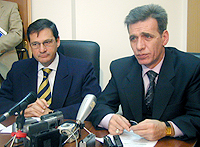
The Ministry of Labor and Social Policy began a project on institutional development of the social care and protection within the social development and employment department, for which the European Commission has provided technical assistance amounted to 2 million, Minister of Labor and Social Policy Bedredin Ibraimi told at Thursday's press conference.
The project will be realized in several stages in the next two years. Steering Committee led by Minister of Labor and Social Policy will administer the project. Representatives from the ministries of health, education, local self-government and from the social institutions will be also included in the Steering Committee. The European Commission has also engaged consultants from the Greek company "European profiles" to provide the necessary technical assistance.
"The project encompasses two components. With the first one, the management of the Ministry of Labor and Social Policy should be enhanced by examining the organizational setup and the functioning of the ministry. Measures for improving the work in all sectors will be also suggested," Ibraimi explained, adding that an attempt will be made in the second phase to promote the methods applied in the social institutions and the Centers for social protection.
Head of European Commission's delegation Jose Manuel Pinto Teixeira stressed that with the granted support, the Ministry will improve the quality of the services provided by the social institutions and the centers for social protection.
"On the other hand, the development of the institutions is crucial as communications and formal relation will be established among the state, private institutions and the non-governmental organizations that provide social care and protection to the vulnerable groups," Teixeira said.
According to him, the improvement of the social protection is related with the economic development, but also depends on the quality of the labor force, the capacities of the authorities and the non-governmental organizations that work in the field of promoting the social protection and assistance.
This project should enable cooperation with other donors in order to provide finances for more successful social policy and harmonization with EU standards.
The project will provide better services to the unprotected children, old people, single parents, people with special needs and to 75,000 families that receive social assistance. MILITARY ATTACHS VISIT STIP GARRISON. MIA 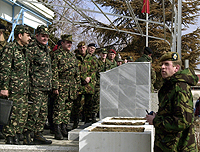
The military attachs accredited in Republic of Macedonia visited Thursday Penus military camp and Stip garrison, where 25 instructors from the Macedonian Army and 13 from the police are trained. After the completion of the training course the instructors will give lessons to the rapid reaction forces.
The training is led by British military advisor in Macedonia and the Training Center for Central and Eastern Europe from Viska, Czech Republic.
The training of the Macedonian instructors is based on the procedures for use of forces, the concept on police priority, direct cooperation between the Army and police, use of minimal force and realizing the operations in compliance with the legal regulations.
The training course has three phases and is realized in five weeks. The first phase was realized from January 14-20, the second from January 21 -February 8 and the third from February 11-22.
British advisor for antiterrorist operations, major Richard Camp emphasized that their assistance within this course results from the bilateral cooperation in the field of defense between Great Britain and Macedonia.
According to him, the course is not training by applying the military tactic, but rational strategy in the antiterrorist operations based on the British experiences.
The training also encompasses careful activities with the civilians, and some of the activities can even offer peace support, what can be of great use for the Army.
According to the major of the course Gjoko Maksimov, the rapid reaction unit is established from the core of the First infantry brigade, and the instructors will further pass their knowledge to the entire unit. 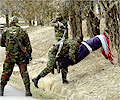
"The goals of the course are development of own tactical procedures for the Macedonian security institutions according to the legal regulations and the local needs for antiterrorist operations. The most important parts of the training are those encompassing the observing and supervising tactics," Maksimov said.
According to major James Anderson from the Scottish Regiment of the British Armed Forces in Viska, the aim of their training-camp is to learn the military strategy, and the training is just a way of transferring their methods to the security forces in compliance with the interests of the host countries.
Major Anderson explained the aspects of the Macedonian rapid reaction forces' training, emphasizing the reactions to incidents, the media and public relations, crowd's managing and prevention of large-scale incidents.
Commander of the First Infantry Brigade, Brigade General Miroslav Stojanovski stressed in his address to the military attachs, that their visit aims to review the activities and the level of preparation of the course attendants.
"It is very important for us that the members of the Army and Police are additionally trained in order to fight against the terrorist and criminal groups," Stojanovski said.
He stressed that this visit reflects the efforts of the Macedonian Army to make all its activities transparent.
Chief of Army's Staff General Lieutenant Metodi Stamboliski and Police General Risto Galevski also attended the meeting with the military attachs. Regular Press Conference Of NATO, OSCE and EU in Skopje. Reality Macedonia By Irina Gelevska
Skopje-NATO waits for official request for new extension of Task Force Fox in Macedonia. "We know about the public statements of some Government officials but we expect tomorrow during the visit of the General Secretary George Robertson this official request to be hand over"-said the NATO spokesman Mark Leity adding that the military experts of NATO are already working on the organization.
"The return of the police in new group of villages is planed very soon"-said today the OSCE spokesman Florin Pasniku.
The new group of villages in which the police should enter till the end of this week or early next week are concentrated around the two so-called cluster Police Station (regional police stations for group of villages) in the villages Grupchin near Tetovo and Srbinovo near Gostivar. Skopje's village Radusha is not again on the list. According OSCE, in this village the observers are working on the process of building trust.
Today UNHCR bus line have started to operate from Radusha to Skopje. "This village is one of the places where the returning of police is little difficult but the return of police means return of the state, electricity, water in these parts not just the police"-said Leity.
The EU spokesman Irena Gjuzelova deny today that the special EU representative in Skopje Alan Leroa have returned from Brussels with set date for new early elections in Macedonia. "It is up to the Macedonian Government to set the date for new elections"-said Gjuzelova adding that the international community will be glad if the elections are scheduled as soon as possible so the timetable for implementation of the rest of the laws of the Framework Agreement is finally set. LIBYA-ACCUSED BULGARIAN MEDICS-MEETING WITH AMBASSADOR. BTA Bulgarian Ambassador in Tripoli Meets Accused Bulgarian Medics.
Tripoli, February 7 (BTA) - The six Bulgarian medical workers held in custody in Libya, who were moved from the Judaida prison to a self-contained house in a guarded area earlier this week, are expecting to meet their Libyan lawyer Osman Bizanti before the next sitting of the court on February 17, Bulgarian Ambassador in Tripoli, Lyudmil Spassov, told BTA. Ambassador Spassov visited the six Bulgarians on Wednesday. Bizanti himself told BTA that he will meet his clients at the beginning of next week.
The six Bulgarian medical workers are accused of deliberately infecting 393 Libyan children with AIDS and conspiring against the Libyan state. With the assistance of the Gaddafi International Foundation, chaired by the son of Libyan leader Muammar Gaddafi - Seif al-Islam, the Bulgarian medics were moved from the Judaida prison to a guarded house.
Ambassador Spassov told BTA that the six are feeling better after they were moved. As regards their physical state the medical examinations and care for them continue as ordered by the Court, Spassov added.
Ambassador Spassov saw the Bulgarian medics in the yard of the house to which they were moved. The six Bulgarians talked over the phone with Foreign Minister Solomon Passy in his presence. During his visit to Tripoli at the end of December Passy saw the Bulgarian medics outside the Judaida prison.
The Bulgarian medical workers were detained in February 1999. The trial against them began a year later. The returning of the verdict has been postponed twice so far. Bulgarian Medics in Libya Feel like at Sheraton. Standartnews The detained Bulgarian medics in Libya are accommodated in a blue-chip villa. In a telephone conversation with Foreign Minister Passy they said the they "felt as if at the Sheraton hotel", said Parliamentary Chairman Ognian Gerdzhikov yesterday after talks with Deputy Foreign Minister Petko Dimitrov.
(ML) Byzanti: The fact, They Are Out of Jail, Doesn't Make Them Free. Standartnews The fact, that the Bulgarian medics are moved out of jail, doesn't mean they are free, said on BBC on Tuesday Osman Byzanti - Libyan attorney of the six Bulgarians. He specified the shift of the bail as a good sign. The lawyer attributed the medics move out to God's will and to 'Gaddafi' Foundation. Osman Byzanti intends to pay a visit to the Bulgarian medics next week.
(SH) BULGARIA-EU-PARLIAMENT. BTA EU-Bulgaria Joint Parliamentary Committee Holds Extraordinary Meeting in Presence of President Purvanov.
Strasbourg, February 7 (BTA) - At an extraordinary meeting Thursday, the European Parliament announced its new chairman of the EU-Bulgarian Joint Parliamentary Committee, Jose Maria Gil-Robles, and his deputy, Catherine Guy-Quint.
The meeting was organized especially for the visit of Bulgarian President Georgi Purvanov in the European Parliament.
Purvanov thanked the MEPs for the chance he was given to present the position of the Bulgarian presidential institution, He said that his visit to Brussels and Strasbourg is a clear sign of continuity and consistency in the Bulgarian foreign policy and Euro-integration.
The line-up of the Bulgarian delegation to Belgium with representatives of all parliamentary factions, reflects the full public and parliamentary consensus that exists in this department. The Bulgarian side has expressed a position for irreversible European integration and this position was upheld by all European partners, said the President. "Now is the time for action," he added.
In his words, both power-holders and opposition in Bulgaria are working hard towards meeting the EU membership criteria and solving the problems.
Purvanov further voiced hope that the next report on the Bulgarian progress towards EU membership will describe the country as a working and competitive market economy and will recognize the efforts in the social sector, including the rights of minorities and handicapped people, as well sa the results of the administrative reform.
All institutions are involved in the efforts to reform the judicial system. We want an independent judiciary, said the President.
According to him, the Bulgarian Government has achieved visible results in fighting corruption. There is also progress in harmonizing the Bulgarian legislation with the European, but is more to be done towards its implementation. The Government can also boast progress in integrating the national minorities - the people that suffered the worst aftermath of the economic reform - and now they are represented at all levels of government.
The government institutions are manned by several parties but there is good cooperation within, said President Purvanov adding that "a former monarch and a former socialist work in balance and cooperation, and this provides a groundwork for lasting political stability".
He promised that no bad new will be coming from Bulgaria - in the coming days and weeks or in the coming decades.
Bulgaria and its neighbours have stable and goodneighbourly relations, free of any territorial claims. The country has provided moral and political, as well as military and technical aid to FR Yugoslavia and Macedonia, and will continue to do so should the neighbours request it, said Purvanov.
According to him, Bulgaria responds quickly and efficiently when necessary. In the actions of the world anti-terror coalition, it is providing logistical support and is now sending troops to Afghanistan.
Taking up another topic, Purvanov expressed hope that the principle of equality of the membership candidates will be preserved in the relations with the EU, and these countries will be assessed according to their individual merit and not based on some political criteria.
Purvanov said that he would attach no deadlines to the accession process because what matters now is to do the job well.
President Purvanov was asked by MEPs of Greece, Scotland and Italy about the relations with the other Balkan countries and about the Kozlodoui Nuclear Power Plant. He repeated that Bulgaria will keep up friendly relations with all neighbours and will not seek any bilateral or other formations, which may trigger new tensions in the Balkans.
He also voiced hope that Greece and Turkey will support the NATO candidacies of Bulgaria and Romania.
Talking about the Bourgas-Alexandroupolis oil pipeline project with Russian, Bulgarian and Greek participation, Purvanov said that it can be the fastest to implement of all infrastructure projects. Security goes through infrastructure projects and Europe should invest in peace in the Balkans, he said. He also expressed hope that the Stability Pact will get the necessary financial support to be able to promote stability and security in Southeast Europe. He named as an example the long awaited rail link between Bulgaria and Macedonia, which, he said, can be much more useful than any military or technical aid.
As for Kozlodoui, Unit 5 and 6 meet all safety standards, Unit 3 and 4 have gone through serious upgrading programnmes and were substantially modernized, said the President referring to reports by Bulgarian and foreign experts. "No less that the citizens of Europe, we put nuclear safety as the overriding consideration," said Purvanov. It is on this basis that Bulgaria is writing its new energy strategy. It is due to be ready in several weeks' time and will be offered for discussion at all European institutions.
"We stick to our position of November 1999," said Georgi Purvanov. "With calm, tolerance, responsibility and professionalism, we will seek a solution together with you. Excessive dramatics should be avoided and Europe should respond in the same manner," he said in conclusion.
Under a 1999 Memorandum of Understanding between Bulgaria and the European Commission, Kozlodoui's Units 1 and 2 are to be closed by 2003 and also by that time, a timeframe must be agreed on closure of the two other 440 MW reactors, Units 3 and 4. PM Will Separate the Ministries. Standartnews Nadelina Aneva
PM Saxe-Coburg-Gotha thinks over the separation of some of the ministries, NMS MPs announced. Thus he would painlessly free himself of the undesired people. The Ministry of Transport and Communications and the Economic Ministry were targeted, too. This is a way the Transport Minister Plamen Petrov, whose resignation is demanded by some BSP and UDF MPs, to be expelled, too. The NMS singled out a group of speakers, who will defend the stand of the rulers at the debates before the non-confidence motion. Dr. Antoniya Parvanova, who's famous for being an ardent critic of Deputy-Minister Atanas Katzarchev is not among the selected ones.
(PY) N. Mihailova: Bakardzhiev Is Not Interested In My Being The Leader. Standartnews Elena Yaneva
"If there is anyone who is not interested in my becoming the UDF leader, it is Evgenii Bakardzhiev", the UtdDF PG leader Nadezhda Mihailova said in a statement. Thus she commented on the words of ex-leader of the Youth UDF Velislav Velichkov that Bakardzhiev was behind the Youths' initiative to nominate her. To Mihailova, at present, attempts are made to make use of her name. "I've always stressed that I do not want to be used by anyone, as well as to speak on my behalf or associate me with anyone," Mihailova said. To her, the years she spent in politics proved that she had ideas and face of her own. "It is the future to show if my ideas are marketable in terms of politics," Nadezhda Mihailova pointed out.
(ML) Deputy Ministers to Be Replaced After the Non-Confidence Motion. Standartnews The MRF will back the cabinet, the left-wing coalition will abstain.
Nadelina Aneva
Few deputy ministers will be replaced after the non-confidence motion made by the UtdDF be voted on, MPs from the majority said for "Standart" yesterday. Deputy of Finance Minister Milen Velchev Atanas Katsarchev was said to top the list. He is the direct culprit for the motion because he is responsible for the mess with medicines, NMS deputies said. In late February, dismissals are expected among the medium echelon, for both the MRF and Coalition "For Bulgaria" insist on it. The vote will be open. The cabinet is sure to survive after that. The NMS and MRF, who are the majority, will be against the non-confidence motion. Their left-wing colleagues will abstain from voting.
(ML) Sofianski Asked for Third Mayor's Tenure. Standartnews Japan is to send experts to examine the investments opportunities in Bulgaria.
Silvia Nikolova
Stephan Sofianski is pondering over putting up his candidature for a third tenure as a Mayor of Sofia in a year and a half, it transpired yesterday. "There is enough time but on seeing how well the things are with the constructing of the subway and the investments in Sofia, I'm already thinking over such a possibility," the mayor admitted yesterday. At the next local elections, however, he is to be nominated by the Union "Free Democrats" in his capacity of the party leader. There were two mayors running Sofia for two successive terms of office: Dimitar Popov (1952-62) and Peter Mezhdurechki (1978-86). Sofianski opened a memorial plaque at the "Serdica" subway station on the occasion of the agreement for credits, signed with the Japan's Bank for International Cooperation, amounting to $104 million.
(ML) Scandal Who to Present Bulgaria at the Convent. Standartnews Elena Yaneva
A scandal who to present us in the European Convent broke out in the Parliament yesterday. Representatives of the BSP insisted Alexander Arabadzhiev to be a titular representative of the BSP. The BSP couldn't impose its stand. The Parliament approved as titulars Daniel Vulchev from the NMS and Nikolay Mladenov from the UtdDF. Arabadzhiev and Nesrin Ouzoun from the MRF were approved as their deputies. Lyuben Kornezov qualified the decision of the parliament as an agreement between the NMS and he UtdDF. After the refusal of Peter Stoyanov the cabinet is expected to single out its representative.
(PY) NATO Levels Criticisms at Bulgaria for the Army Reform. Standartnews You have equal chances for membership, George Robertson believes.
Antoineta Markova, Brussels
Reporter of "Standart"
"Bulgaria is not just a NATO aspirant but an important NATO partner," NATO Secretary-General George Robertson said yesterday after talks with President Georgi Parvanov at the headquarters of the Treaty in Brussels. Robertson said further that he made a clear-cut statement before Bulgaria's president that for now, the Treaty had not decided about which of the 10 countries aspiring for membership will be admitted to NATO at its November summit in Prague. Robertson pointed out that all the aspiring countries had equal chances. Parvanov was also received by Gen. Joseph Ralston, Supreme Commander-in-Chief of the NATO forces in Europe. He appreciated the progress of Bulgaria but said that we had not still achieved the necessary changes in the army. Though he said further that the American army was not reformed in the right way, as well.
(ML) A Greek expert would consult the government about NATO. News.bg 
The government approved a draft memorandum for agreement between Bulgarian and Greek Ministries of Defense for sending to Bulgaria a Greek military consultant as a concrete step towards the implementation of the program for cooperation, the Cabinets Information and Public Relations Department reported. The consultant would advise Ministry of Defense and the Bulgarian Army General Staff as for unfolding relations with the NATO according to several leading directions, as follows: the membership plan, the annual national program, the planning and reviewing process, the key initiatives of NATO, and the individual partnership program.
With another decision of today, the government changed the way of financing the participation of Bulgarian troops in the peacekeeping operations in Bosnya and in Kosovo. Bulgarian servicemen would receive USD 25 per day for the period of their participation in the missions instead of the former salary of DEM 1550 per month. Kremikovtsi at a Stand Still. Standartnews Frustrated export deal emptied the plant's cash-box, an audit checkout of the deal is demanded.
Nevena Mirtcheva
Stefan Kioutchukov
"Kremikovtsi" metal works will stop working on Monday. The reason is that the customs authorities banned the export of four ships loaded with its products. The plant will suffer 15-million-dollar losses, well-informed sources said yesterday. The accounts of the metal works are frozen because of an stale debt to the state worth of 3 million levs. Ten thousand workers from Kremikovtsi are ready to walk out for a protest rally in front of the Presidency and Council of Ministers any moment, warned Trade Union Chairman, Zhelyazko Hristov. In his opinion, therewas an agreement to reschedule the debt. Despite the fact that 500,000 levs were paid off, the accounts were not "defrosted" The plant is among the most indebted to the state, commented press attache to the Minister of Finance, Olya Getcheva. Kobzon Brought Tears to the Eyes of Bulgarians. Standartnews Scandal with Lily Ivanova at the Concert in honour of Joseph Kobzon.
Joseph Kobzon brought tears in the eyes of the audience in hall one of the NPC last evening and made people sing together with him 'My Country, My Bulgaria'. Everybody stood up as if the national anthem was being performed. The MP from Russian Duma succeeded to inspire vitality in otherwise hard-driven concert in honour of composer Joseph Tzankov. At the last moment prima Lili Ivanova refused to come on the stage. She should have performed 'Saturday Evening', the song of Tzankov, which made her famous. Behind the curtains people talked that the star demanded the high payment of $1000 and because of that the organizers expelled her. Among the performers who made good impression were the children from 'Winnie the Pooh', Biser Kirov, Stephka Onikyan and Kamelia Todorova. Margret Nikolova and Georgy Kordov performed their songs playback, but for people at their age this is quite comprehensible.
Georgy P. Dimitrov
(PY) Bulgarians Harbor the Thought of Being Victims. Standartnews It's not politicians and businessman who have to make assessment, but the missing link - the elite with impeccable reputation.
What Bulgaria and we, Bulgarians, didn't learn during the last 12 years? Which are these things which we didn't outlive? And that constantly hinder our progress? On January 31, 'Standart' organized a discussion entitled 'The Unassimilated Political Lessons from 1989 till Now'. Sociologist Petar-Emil Mitev, political scientist Vassil Garnizov, Direcor of the National Historic Museum Bozhidar Dimitrov and lecturer at the University for National and World Economy Associate Professor Boyan Durankev, psychologist Dr. Nikolay Mihaylov and spokeswoman of the NMS Emel Etem talked in the office building of 'Standart' for nearly 4 hours. We publish some of the opinions of the participants in this discussion.
Vassil Garnizov
Political analyst
Two extreme theses are taking shape in the Bulgarian society. The first one is that others are writing our history for us, hence the Bulgarians don't have any choices. A great number of people take this stand, people we are living and working with. This stand has taken deep roots. The other stand, that chairwoman of the MRF, Mrs. Emel Etem upholds, boils down to the question, where are we? Mrs. Etem claims that we are writing our history ourselves. She is convinced that she herself has written at least one page or a footnote. As for me, I'm sure that there are oscillations in the Bulgarian history, between attempts at rebellion, re-writing of history, re-negotiating of something already agreed on, and other periods, when the governance wears off. During the rule of Philip Dimitrov, there were attempts Bulgarian politics to be an alternative to geo-political scenarios once. And another time - to the internal economic processes. At that time we made attempts to enliven all that was political. Politics was something that guided the nation and determined its visions. This "visionarism" was condemned as political non-realism. When Dimitrov's cabinet fell, Berov's government came to power. From this angle of vision, it hasn't tried to re-write the hitherto agreements or to behave as an overseer to the Bulgarian big business. They even tried to be its partner. Then Jean Videnov entered the scene, who imposed his own visionary-like attitude and offered resistance to both Russia and the West. It's difficult to me to give assessments to Videnov's style of rule, for it is not properly documented.
The same tendency persisted during the Kostov's rule - strong political "visionarism", attempts to re-negotiate the sales and terms. So, my question is - what is the nature of the government of Simeon Saxe-Coburg-Gotha now? Whether he is trying to follow the visionary course in the modern Bulgarian history? Or follows the scenario written in Malta in 1989? Maybe, when this government turns one year in office, we'll 'e able to decide if they fit into the definition of visionaries, who tried to re-write the Bulgarian history. Or follow the tradition, according to which politics should fit into the brackets of possible an foreseeable. This is also politics of great importance and realism. I wouldn't denounce neither those who stuck to the principles of real politik nor those who pursued the visionary policy. This is the kind of assessment that has to made by the national elite, not the elite of the business. It has to be made by a missing third link - someone who are not involved into certain political decision-making or benefited from it. These are the people who don't reap ample profits as consultants to big companies.
If we don't speak out and comment the issue, we shall forever remain slaves of foreign intentions and strategies. And will never take definite shape as a nation. Dr. Nikolai Mihailov once made a remarkable statement - we are not the first people which will be deleted from the civilization. We have to get used to the idea that the Bulgarians are quetly waiting in the line of nearly extinct peoples and there's nothing dramatic in it. Bush names new ambassador to Bulgaria. Online.bg - AP 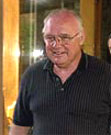
President George W. Bush tapped veteran diplomat James W. Pardew to be ambassador to Bulgaria, AP reported. Pardew, a 28-year Army veteran, is currently a special adviser on Southeast Europe for the State Department. During the Kosovo conflict, Pardew was deputy special adviser to the president and secretary of state on democracy in the Balkans. He previously directed the Military Train and Equip program for Bosnia and was part of the U.S. team in negotiations on the Dayton peace agreement for Bosnia. His nomination to head up the U.S. embassy in Bulgaria must be confirmed by the Senate. Top Officials Made Bundles Unlawfully. INTERVIEW Standartnews: Georgi Petkanov I won't give out particular names, we are drafting amendments to the law to expose them, says Minister of Interior Georgi Petkanov for Darik Radio. 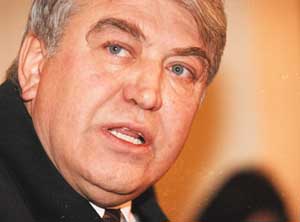
- Mr. Petkanov, how would you assess the performance of the Interior Ministry in the last six months? - To make a self-assessment is difficult. It's the business of the society and media. However, I dare say that within this period the work of the Ministry deserve positive assessment. I can even give statistical data to support my statement. They testify to our achievements - the rate of disclosed crimes, curbed criminality and other positive results. This, of course doesn't mean that we don't have our blemishes. - During your visit to Ireland you said that you are going to set up a special unit to investigate the people who amassed their wealth unlawfully. How are you going to do it and when? - I'm highly pleased with my visit to Ireland. We had extensive talks about the unlawful sources of income. We understood what is their practice. If you cannot evidence that these incomes are unlawful and initiate a criminal legal procedure, you should chose the Civil Procedure Code as an alternative. You ask the person to prove the legal origin of the incomes he has. If the evidence is not provided, the incomes and property of a culprit are distrained. A person has to prove the origin of his means, be it money or realty, for the last 7 years. If he fails to do it within a given term, his property will be confiscated for the benefit of the state. - Is there a list of people whose wealth is unlawful? - No, we don't have such a list, but we have a rough idea who they are, or maybe some of them. And I personally... - Who are they? - No, I cannot name them now. What is the problem? You see that a certain person has the means that go far beyond his incomes. Clearly they come from some illegal activity - drug deals, smuggling, all kinds of fraud, like tax evasion and false insurance. - Are there statesmen among these people? - In all probability there are. Certainly there are, but I cannot name them now. - Can you say at least how many are they? - We haven't counted them. - Could you be more concrete? - No, I can't give any figures, but they are quite a few, yes quite a few. - Does that mean that the statesmen top the list? - You lay the stress on this question, but you have to understand that if I don't give out names it means that I don't want to give out names. I can only say that there are top officials among them. (Abridged) 5-century Cemetery Found in Rousse. Standartnews Tsvetelina Doncheva
An ancient Christian cemetery was dug up during earthworks in the town of Rousse. The find was made at the "St. Trinity" Square while excavating to install pipes for a new building. By the Christian tradition, the human remains were laid east-west. The crosses found suggest that the cemetery dated back to the 5 century. It is a second time in the recent few months that the workers came across human skeletons during earthwork in this region.
(ML) Clinton To Miloshevich: "Its Nice to Hear Your Voice" Reality Macedonia - Yahoo! News 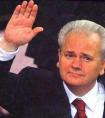
Slobodan Miloshevich Croatian military intelligence service eavesdropped on Serbias former President Slobodan Miloshevich, recording his phone conversations with his family, friends and business associates, including candid details related to former President of the U.S. of A. Bill Clinton. Zagreb weekly Globus published the transcripts, creating a sensation. 
Bill Clinton and his cronies. Read more about it at Yahoo! News (click the source link on the left). Macedonian daily Vest got exclusive rights to publish the transcripts in the country. In a seemingly related development, according to Guardian Unlimited, Miloshevich's lawyers indicated that they'll ask Hague war crimes tribunal to summon Clinton (USA), Blair (UK), Schroeder (Germany) and Chirac (France) to testify at the ongoing trial. Exercises In Wishful Thinking. the Balkan Express Balkans in Empire's shadow.
Nebojsa Malic
February 7 , 2002
In the past several weeks, news from the Balkans has grown scarce, overshadowed by reports of disasters elsewhere and apprehensive analyses of the Emperor's Big Speech from last Tuesday. Alas, this does not signal the arrival of peace and prosperity, but merely a calm before some new storm can arise. Balkan winters being harsh and hostile, most of the physical fighting waits till the spring. Politics, however the continuation of war by other means, as Clausewitz would have said is by nature an indoor activity, and thus exempt from the elements.
The few news snippets that managed to find their way onto the net only confirm that the ongoing political war in the Balkans is far from over, and shows no sign of calming down.
BIDING TIME IN MACEDONIA.
Not surprisingly, Macedonia offers the most striking portent of clear and present danger waiting in the wings of winter. As Macedonian political parties fragment under the fallout from the disastrous Treaty of Ohrid, their Albanian opponents are actually unifying around Ali Ahmeti, leader of the UCK bandits, no less. Additionally, Arben Xhaferi, still the senior Albanian politician in Macedonia, in a recent interview sought to disabuse the Macedonians of any notion that the Ohrid surrender would actually spell an end to Albanian demands.
If Macedonians resist new Albanian demands, the rumors of war come spring might be more than just corridor-talk of idle European political hacks.
TRUTH, UNRAVELING.
Nary a peep has been heard from Kosovo recently, though problems with electing a local "president" and replacing the outgoing UN governor had received quite a lot of press coverage earlier. The new governor, Michael Steiner, was appointed on January 21st, but little has been heard about him since. Similarly, there is still no "president of Kosovo," as Albanian parties seem unable to reach a power-sharing deal even with the gentle persuasion of Imperial envoys.
One thing that did get reported was the arrest of two Kosovo Albanians in Pristina, on January 28. After lengthy preparation by the NATO occupiers, the two were arrested on charges of murdering fellow Albanians loyal to the Serbian state during 1998 and 1999. Reuters broke the story on January 29, but it seems to have disappeared since.
The development makes certain sense in the twisted logic of Kosovo's overlords. Since everyone just knows that only the Serbs did the killing in Kosovo, Albanians could be nothing but innocent victims or at best mistaken, angry vigilantes attacking the remaining Serbs (who probably deserve it anyway). To suddenly discover that Serbian claims from 1998-99 (before NATO's attack) were true and that the KLA really did kill Albanian civilians whose only sin was associating with the Serbian and Yugoslav governments, would blow a hole in NATO's official history big enough to sail the Sixth Fleet through. Yet it seems the KLA assassins who did such work continued to practice on Hashim Taqi's political opponents namely Ibrahim Rugova's party officials to the extent that began to bother Rugova's foreign backers. Last week's arrest was probably a warning to Taqi and the rest of the KLA not to push any further. The real story got out by accident and, well, the rest is blissful oblivion.
A DAY IN "COURT"
The ever-so-slow unraveling of NATO's Kosovo myth must have been judged as beneficial to its designated villain and his persecutors. It must have galled the best and most loyal agents of the Hague Inquisition to read that their case against Slobodan Milosevic does not hold water. After pretending to have given him a fair hearing, they decided to merge the trials for Bosnia, Croatia and Kosovo into one big ball of pseudo-legalistic yarn.
Chief Inquisitor DelPonte argued that the trials should be combined since the conflicts in all three regions were parts of Milosevic's "criminal enterprise" to create a "Greater Serbia." Needless to say, DelPonte hasn't the slightest intent to offer any evidence proving the supposed "Greater Serbia" was ever more than a wet dream of anti-Serb propagandists. Not only is the assumption of guilt quite enough for the Inquisition, but its decision to bundle the trial is a de facto validation of DelPonte's sick fantasy.
TOTTERING MYTHOLOGIES.
How long before it becomes obvious that DelPonte & Co. have overstretched their imagination in the cases of Bosnia and Croatia as well? Empire's role in both those conflicts is based on myths similar if somewhat less developed to that of Kosovo. Allegations of "Serbian aggression" can in both cases be easily refuted, and further delving into the truth would strip bare the unpleasant evidence of Croatian forces' doings in Krajina, Slavonia, Herzegovina and Central Bosnia, none of which their "advisors" and sponsors care to hear.
Though the regimes that led the secession of Croatia and Bosnia in the early 1990s are officially out of power now, their leaders dead or retired, both states continue to be hostages to the myths surrounding their creation. This has proven a powerful obstacle to the current Croatian government in its attempts to purge the state apparatus of those loyal to late president Tudjman's authoritarian chauvinism. It has also posed immense challenges to the new government of Bosnia's Muslim-Croat Federation in dealing with "guests" from Islamic countries that the Izetbegovic regime invited in 1992-95 to fight a jihad for a "multiethnic" Bosnia.
FUNDAMENTAL(ist) FLAW.
Ironically, because of its success in ethnically cleansing its Serb population and disenfranchising its few remains, Croatia can survive the deconstruction of Tudjman's statehood paradigm. Bosnia is in a different position altogether. Almost ten years after the Izetbegovic regime decided to proclaim independence (provoking a war), members of Bosnia's three main ethnic groups still live in separate historical universes.
The Bosnian Serbs fought for and got a piece of land to call their own. Croats have changed their war objectives so often, there is no way to judge whether any of them were achieved. Muslims, on the other hand, have every right to be displeased with the present situation. They fought for a unified state with a Muslim majority, and definitely not an ungovernable patchwork of federations, republics and local fiefdoms, occupied by NATO troops and ruled by an Austrian viceroy.
Because the Dayton peace effectively torpedoed Alija Izetbegovic's dreams of a monolithic Bosnia, his ideological successors are doing everything in their power to repudiate Dayton and resurrect the dream. If successful, they could destroy the fragile tissue holding the festering wounds of war in stasis, and plunge the land into another round of bloodshed.
For the fundamental issue of the war whether there should be a Bosnia at all, and if yes, how was never resolved, either by arms or by words. It was simply ignored and swept under the rug, seen as irrelevant to the Empire's mythological view of the conflict. For over six years, Bosnia's languishing existence has been blamed on corruption, loose war criminals, insufficient government powers and lack of foreign aid, but no one has ever bothered to point out the obvious, fundamental flaw of Dayton that for many people it was not salvation, but defeat. Having missed the point, Bosnia's various "benefactors" have tried to change the situation through increasing application of statist tyranny, with predictably pathetic results.
Meanwhile, one is left with a distinct impression that Bosnia's foreign occupiers know perfectly well that the entire structure they imposed by force would inevitably collapse if they left and consequently, find themselves in no hurry to actually leave.
BUY ONE, GET ONE FREE.
Serbia's descent into madness has, if anything, accelerated this winter. Electricity bills have soared hand-in-hand with power cuts, in a disgusting display of the old government trick called "distract-and-plunder." While the people are distracted by midwinter power shortages and the prospect of freezing or by trying to comprehend the sudden 300% increase in utility bills the government gets a free hand to sell most Serbian enterprises to foreign investors for pennies on the dollar, while lining its pockets with the utilities' profits. As in elsewhere in the Balkans, Serbian utilities are state-owned, and what good is a monopoly when it can't be used for extortion?
Those who did have power this past week could gasp in shock as Serbia's current finance minister Bozidar Djelic actually praised the successful policies of Bill Clinton in the Balkans. Given that Djelic is a rich migr who made his money by plundering Russia in the service of Western financiers, and that the regime to which he belongs is willing to pull out all the stops in courting the approval of Serbia's former executioners, this is hardly unexpected. That should say something about the state of Serbian affairs, in and of itself.
A GOOD START.
All this points to a depressing realization. Even if Imperial occupation disappeared overnight and it won't there would still be a mountain of trouble for former Yugoslavs to cross. Perhaps as a legacy of decades of confusion, no one there seems to know what they want. Instead, they offer their people fancy-sounding delusions such as "partnership" with the Empire. They claim membership in the EU would solve economic woes, thus putting a vastly overrated cart before the nearly dead horse. Most of all, they seek solace in the sanctity of two buzzwords, "free market" and "democracy." Not only are their policies conducive to neither, but the two concepts happen to be mutually exclusive.
Much has been said and written about the need to understand and accommodate others. Yet that is hardly possible without first knowing and understanding oneself. If the Balkans could get rid of the Empire's jackboot, if its inhabitants prove able to rediscover or reinvent their collective and individual identities, and if they succeed in creating communities built on freedom, not force or servitude, then their future just might look better. It is by no means guaranteed. But it would be a good start. |



